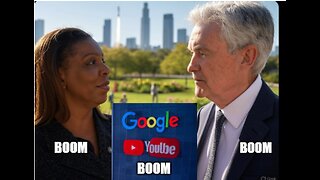Premium Only Content

The Commercial Filmmaking World
The commercial filmmaking world is a dynamic and multifaceted industry that encompasses the creation of various types of video content for commercial purposes.
This industry plays a crucial role in advertising, marketing, and storytelling, and it involves a wide range of professionals and processes. Here are some key aspects of the commercial filmmaking world:
Advertising and Marketing: Commercial filmmaking is primarily driven by the need to promote products, services, or brands. Companies and organizations use video content to create engaging advertisements and marketing campaigns to reach their target audiences.
Types of Commercial Filmmaking:
TV Commercials: Short video advertisements typically aired on television.
Online Advertisements: Videos created for online platforms like YouTube, social media, and websites.
Corporate Videos: Videos used for internal and external communication within organizations, such as training videos, promotional videos, and corporate presentations.
Documentaries: Some commercial filmmakers create documentaries that promote a specific cause or issue while also serving the interests of a sponsoring organization.
Production Process: The commercial filmmaking process involves several stages, including concept development, scriptwriting, pre-production (casting, location scouting, and budgeting), production (filming), post-production (editing, sound design, and special effects), and distribution.
Crew: Commercial filmmaking requires a diverse team of professionals, including directors, producers, cinematographers, editors, writers, art directors, and more. The size and composition of the crew can vary widely depending on the project's scale and complexity.
Technology: Advances in technology have revolutionized the commercial filmmaking industry. High-quality digital cameras, computer software for editing and visual effects, and advanced sound equipment have made it easier for filmmakers to create compelling content.
Advertising Agencies: Many commercial filmmakers work closely with advertising agencies, which develop creative concepts and strategies for ad campaigns. Filmmakers collaborate with these agencies to bring their ideas to life.
Distribution: The distribution of commercial videos can vary. TV commercials are typically distributed through broadcast networks, while online ads are shared through social media, websites, and video-sharing platforms. Corporate videos may be distributed internally or showcased at events.
Budgets: Commercial filmmaking budgets can vary significantly. Super Bowl commercials, for example, often have multimillion-dollar budgets, while smaller businesses may work with more modest budgets for local advertising.
Trends: The commercial filmmaking industry is influenced by ever-evolving trends in marketing and technology. Trends like influencer marketing, interactive videos, and immersive storytelling have impacted how commercial content is created and consumed.
Regulation and Ethics: Commercial filmmakers must adhere to legal and ethical standards, including truth in advertising laws, copyright and intellectual property rights, and guidelines for responsible advertising.
Impact: Effective commercial filmmaking can have a profound impact on consumer behavior, brand recognition, and public perception. Memorable and well-crafted commercials can become cultural touchstones and contribute to a brand's success.
Overall, the commercial filmmaking world is a dynamic and competitive industry that continually evolves to meet the changing needs and preferences of consumers. It combines creativity, storytelling, and marketing strategies to create compelling video content that reaches and engages audiences across various platforms.
#Filmmaking #filmindustry #hollywood #movie #commercialmovie #trends
-
 8:06:34
8:06:34
MyronGainesX
1 day ago $25.59 earnedKarmelo Anthony Merch, Ashley EXPOSES Elon, Filipino President Punishes Vitaly, Iran War Pause!
73.6K16 -
 2:41:54
2:41:54
TimcastIRL
10 hours agoMASS SHOOTING At Florida State, Anti Trump Rumors ERUPT, MANGIONE EFFECT w/ Maggie Moda| Timcast IRL
219K125 -
 2:36:29
2:36:29
The Illusion of Consensus
1 day agoExploring Holistic Psychiatry with Dr. Aruna Tammala: Nervous System Regulation, Diet, Supplements, Self-love, and Social Connection
38K1 -
 2:44:57
2:44:57
Laura Loomer
9 hours agoEP115: Democrats' Pet Muslims Bite Back
64.6K28 -
 18:37
18:37
SantaSurfing
13 hours ago4/17/2025 - Trouble for Tish/Google/Jerome! Trump stops a war!
45K18 -
 49:39
49:39
Man in America
17 hours agoThey’re Feeding Us POISON and Calling It Dinner w/ Kim Bright
70.5K19 -
 3:40:07
3:40:07
BrancoFXDC
7 hours ago $3.77 earnedWarzone Rounds - DAY 10 of no Internet
44K3 -
 1:17:17
1:17:17
RiftTV/Slightly Offensive
12 hours ago $13.40 earnedMASSACRE at FSU: Who was Actually RESPONSIBLE? | Slightly Offensive
66.5K18 -
 3:18:46
3:18:46
SilverFox
9 hours ago🔴LIVE - HUGE UPDATE! LORDS OF THE FALLEN 2.0
41K -
 2:03:46
2:03:46
Roseanne Barr
12 hours ago $24.19 earned"God, Go Get em' Honey" W/ Tal Oran | The Roseanne Barr Podcast #95
116K128